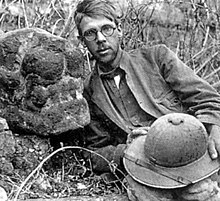Sylvanus Morley
Sylvanus Griswold Morley (born June 7, 1883 in Chester , Pennsylvania , † September 2, 1948 , Santa Fe , New Mexico , USA ) was an American archaeologist , script and Mayan explorer.
Live and act
Morley's career began with a study of the construction and civil engineering engineering at Pennsylvania Military Academy. After Edward Herbert Thompson's findings aroused his interest in Mayan culture , he moved to Harvard University , where he studied archeology . He graduated in archeology in 1908 .
Morley contributed significantly to the study of the pre-Columbian Maya culture in the first half of the 20th century . His most important works include his extensive excavations at the Mayan site of Chichén Itzá . He also published several research papers on the Maya hieroglyphic writing and wrote several popular science books aimed at bringing the Maya world to a wider audience. Although some of his theories had to be discarded due to the current state of research, he was one of the most important archaeologists with a focus on Mesoamerica during his lifetime . His work, especially on the use of the Mayan calendar , is cited to this day. His commitment was a major factor in the interest and financial support for projects that provided many new insights into the Maya.

In addition, Morley worked as an agent of the US Office of Naval Intelligence (ONI), but this only became known after his death.
Honors
- 1943 Loubat Prize for The inscriptions of Peten
Publications (selection)
- An Introduction to the Study of the Maya Hieroglyphs , reprint. Dover Publications, New York City, USA 1975.
- The ancient Maya , 3rd Edition, Stanford (California): Stanford University Press, 1956
- Popol vuh: the sacred book of the ancient Quiché Maya , Norman: University of Oklahoma Press, 1950
- The inscriptions at Copan , Washington, DC: The Carnegie Institution of Washington, 1920
Web links
- Literature by and about Sylvanus Morley in the catalog of the German National Library
- Literature by and about Sylvanus Morley in the WorldCat bibliographic database
| personal data | |
|---|---|
| SURNAME | Morley, Sylvanus |
| ALTERNATIVE NAMES | Morley, Sylvanus Griswold (full name) |
| BRIEF DESCRIPTION | American archaeologist , script and Mayan researcher |
| DATE OF BIRTH | June 7, 1883 |
| PLACE OF BIRTH | Chester , Pennsylvania |
| DATE OF DEATH | September 2, 1948 |
| Place of death | Santa Fe , New Mexico , USA |
